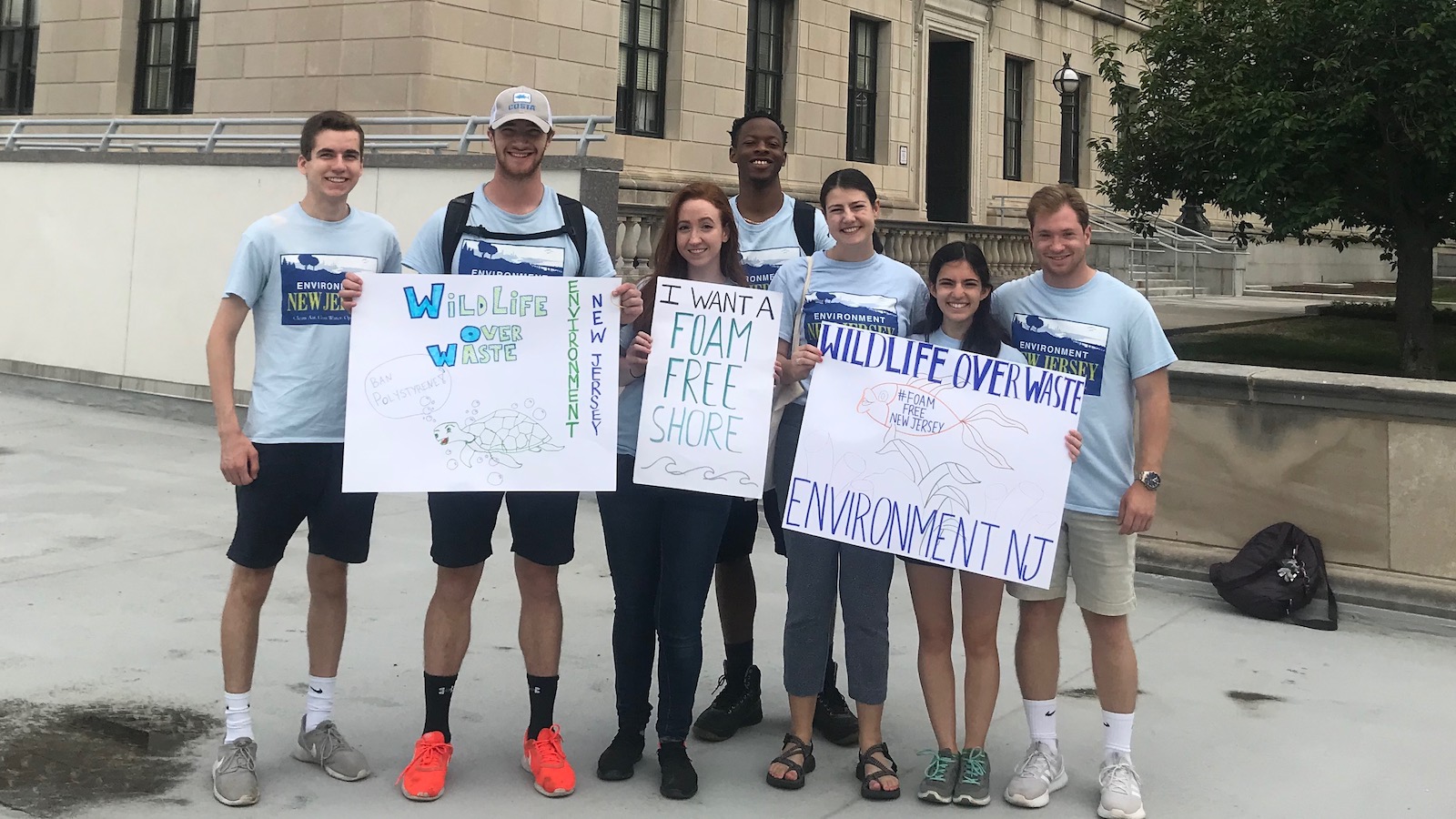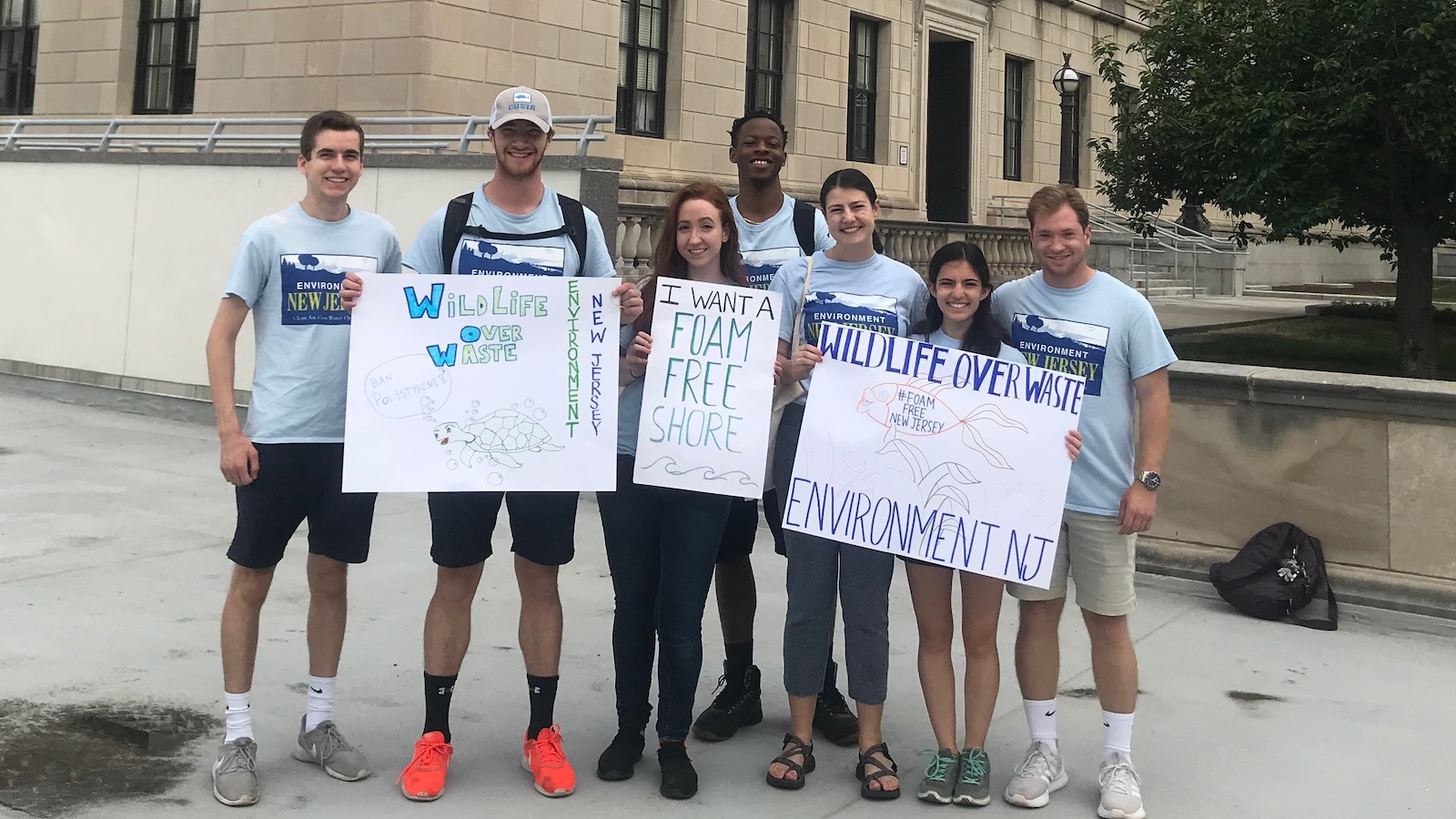How did New Jersey pass the nation’s strongest bill to stop plastic pollution?
Passing the bill to reduce waste from plastic bags, straws and foam containers is a victory nearly three years in the making.

The New Jersey Assembly passed the nation’s most comprehensive plastics legislation on Sept. 24, sending a bill to Gov. Phil Murphy’s desk that would ban single-use plastic bags and paper bags at large grocery stores, prohibit polystyrene foam containers at restaurants, and make plastic straws with meals by-request only, beginning in spring 2022.
What this means for the debate over plastic pollution If approved by Gov. Murphy, the bill (A1978) would make the Garden State the fourth in the country to phase out foam food containers, joining Maine, Maryland and Vermont. New Jersey would also join a growing coalition of states that have rolled out plastic bag bans in the last six years. A “race to the top” dynamic could lead even more states to adopt stronger measures against plastic pollution.
“The New Jersey Assembly voted to pass the strongest single-use ban on plastics in the country to prioritize our wildlife and our communities over endless plastic waste polluting our waterways,” said Doug O’Malley, state director of Environment New Jersey, in a statement quoted by The Hill.
The legislation would be a milestone on the path to slashing plastic pollution in New Jersey. According to Clean Ocean Action’s 2019 Beach Sweeps report, plastic and foam waste accounted for more than 83 percent of the debris volunteers hauled away from New Jersey beaches last year. Among the 12 most prevalent items collected were those that New Jersey’s bill seeks to restrict: straws and stirrers (No. 4), foam pieces (No. 6) and plastic shopping bags (No. 10).
Limiting use of polystyrene foam in particular will help protect New Jersey’s coast from plastic litter. Polystyrene (what most people call Styrofoam) is flimsy and breaks apart easily, making it more difficult to remove once it enters our environment and communities. In a study authored by the nonprofit NY/NJ Baykeeper that estimates 165 million plastic particles are suspended in New York and New Jersey’s Harbor Estuary waters, polystyrene foam made up 38 percent of the plastics discovered in water samples.
What environmental advocates and activists did to win Winning A1978’s passage through the Assembly is a victory nearly three years in the making.
- Since 2018, Environment New Jersey canvassers have knocked on more than 150,000 doors to build public support for legislation to ban polystyrene foam, collecting petition signatures from tens of thousands of New Jerseyans.
- In 2018, we opposed a bill to install a plastic bag fee that would have preempted towns and cities from passing their own plastic bag bans. Immediately after Sen. Bob Smith (Middlesex) announced the governor’s intention to veto the bill at the Legislature’s annual summer Shore hearing, O’Malley remembers being invited to testify with a set of environmental allies in support of the then just-introduced bill to ban single-use plastics and polystyrene. Following that hearing, O’Malley delivered more than 10,000 petition signatures in favor of the ban to key state legislators.
- When Gov. Murphy followed through with the veto, we applauded his leadership. Preserving municipalities’ ability to regulate plastic items has allowed 55 New Jersey towns and cities to set local limits on single-use plastics to date, giving industry groups more reasons to agree to a strong statewide policy.
- NJPIRG Student Chapters worked to run campaigns both to ban single-use plastic bags at the Rutgers New Brunswick campus and to pass an ordinance through New Brunswick City Council to ban single-use plastics bags. The organization worked to collect thousands of petition signatures from both students, local businesses and community members and publicized their efforts to build up momentum for local action.
- This year, to build support for A1978, our staff delivered testimony at committee hearings alongside coalition partners, which include Beyond Plastics, Surfrider Foundation, Clean Ocean Action and the New Jersey Sierra Club, and met with lawmakers and key legislative staff. Testifying alongside us were Cindy Zipf, executive director of Clean Ocean Action; John Weber, mid-Atlantic regional manager of Surfrider Foundation; Jeff Tittel, senior chapter director of New Jersey Sierra Club; and Amy Goldsmith, New Jersey state director of Clean Water Action.
- In the final two weeks before the bill came to an Assembly vote, we worked closely with our allies to inspire citizens to call and write letters of support to their elected representatives, and lobbied lawmakers to shore up votes. These efforts helped to secure a broad majority of 48-24-7 in the Assembly.
- Across the country, our partner groups have helped build momentum by winning similar policies to reduce plastic waste. California was the first to adopt a ban on single-use plastic shopping bags in 2014 — a law that Environment California helped put on the books. Since then, seven more states have adopted their own bag bans. And in 2019, Environment Maine and Environment Maryland championed first-of-their-kind laws banning foam containers.

Photo: Environment New Jersey canvassers, pictured here during a lobby day at the New Jersey state house, knocked on doors in 2018 to build support for a polystyrene ban. Credit: Staff
What happens next Environment New Jersey is calling on Gov. Murphy to sign this sweeping legislation to cut down the plastic waste polluting the Jersey Shore, harming our state’s wildlife, and littering our neighborhoods — and to send a message to other states that they, too, can join our state in leading the drive to end plastic pollution.
“Plastic and polystyrene items we use for 15 minutes should not end up in our environment and communities for endless generations,” said O’Malley. “We urge Gov. Murphy to sign this legislation as quickly as possible.”

